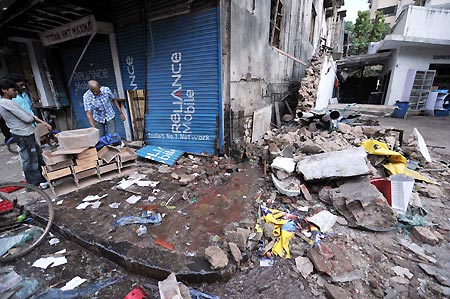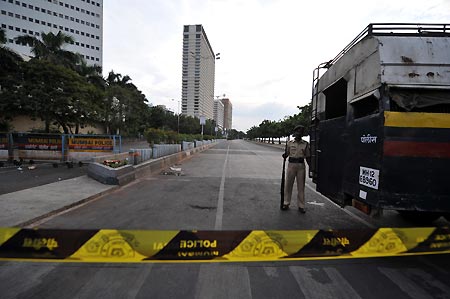Secondly, cross-border terrorism has become a major threat to the country's security. Bordering on Afghanistan, Pakistan and Bangladesh where some terrorist groups are operating, India is vulnerable to these attacks. The Kashmir separatists have grown more worried because of the improved ties between India and Pakistan and might have been involved the latest attacks in their bid to sabotage India-Pakistan relations.
Independent security analyst K. Subrahmanyam suggested that a primary motive for the Mumbai attacks could well have been a desire to "wreck the peace process" launched by India and Pakistanin January 2004.
 |
|
A shopkeeper cleans the shop near Nariman house where terrorist attack took place in Mumbai, India, November 30, 2008. After the final siege at the Taj Mahal hotel, lives of people in Mumbai began to return to normal. But the main areas, which were attacked by the terrorists, are still blocked by the police.[Liu Sui Wai/Xinhua]
|
The attacks, involving multiple targets and hostage-taking, bears "the hallmarks of Al-Qaeda attacks in the Middle East and North Africa", said former national security advisor Brajesh Mishra.
Thirdly, separatism is flourishing in India which has a vast territory, a large population and unbalanced economic development. The widening gap between rich and poor has triggered discontent among minorities and social conflicts are becoming more serious.
According to statistics from the Indian Interior Ministry, there are 275 terrorist groups in the country. For years, the government has been trying to ease conflicts through dialogue and negotiations, but the effort has not yielded much results.
 |
|
Police block the way to Oberoi Hotel where terrorist attack took place in Mumbai, India, November 30, 2008. After the final siege at the Taj Mahal hotel, lives of people in Mumbai began to return to normal. But the main areas, which were attacked by the terrorists, are still blocked by the police. [Liu Sui Wai/Xinhua]
|
High prices
The Mumbai attacks have dealt a heavy blow to the credibility of the ruling Congress party-led coalition government, especially in the run-up to the general elections scheduled for next year.
After the last militant was gunned down by the Indian commandos on Sunday, the public has been questioning the ineptness of some politicians and security loopholes. The Congress government was blamed by many for the loopholes that allowed the heavily-armed Islamist gunmen to come across the seas to land in Mumbai. Others decried the Hindu nationalist party BJP for seeking electoral advantage.
India's home minister and security minister both resigned on Sunday, taking responsibility for the deadly attacks.
The attacks were another blow to the Prime Minister Manmohan Singh's cabinet, as public confidence in the government has been falling due to rising inflation at home and the global financial crisis. How to cope with the aftermath of the terror attacks would be an immediate challenge and serious test for the Singh cabinet.
(Xinhua News Agency December 1, 2008)